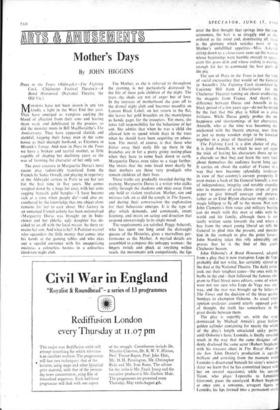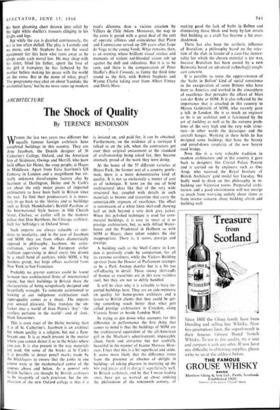8T1M 1A - f_UgUl1J,.1
Mother's Days
By JOHN HIGGINS
Days in the Trees. (Aldwych.)—The Fighting Cock. (Chichester Festival Theatre.)—A Bond Honoured. (National Theatre, the Old Vic.) MOTHERS have not been shown in any too kindly a light in the West End this year. They have emerged as vampires sucking the blood of affection from their sons and leaving them weak and debilitated in the process, as did the monster mum in Bill MacIlwraithe's The Anniversary. They have appeared sluttish and slothful, keeping their fancy man in the same house as their decrepit husband, as Eleanora in Mrozek's Tango. And now in Days' in the Trees we have a broken and tearful mother, as little capable of shaping her declining years as she was of forming the character of her only son.
The poor creature in Marguerite Duras's most recent play (admirably translated from the French by Sonia Orwell, and playing in repertory at the Aldwych) arrives in Paris to see her son for the first time in five years. She comes weighed down by a huge fur coat, with her arms sagging beneath gold bangles-1 have become rich at a time when people die'—and also en- cumbered by the knowledge that one object alone remains for her to care about. Her factory in an unnamed French colony has been nationalised (Marguerite Duras was brought up in Indo- china) and her elderly, ugly daughter has de- cided to go off with the local mayor. So there re- mains her son: And what is he? A Parisian wastrel who squanders the little money that comes into his hands at the gaming tables and who ekes out a squalid existence with his unappetising mistress, a colourless hostess in a colourless third-rate night club. The Mother, as she is referred to throughout the evening, is not particularly distressed by the life of these pale children of the night. The tears she sheds are not of anger but of love. In the interests of motherhood she goes off to the dismal night club and becomes maudlin on Lanson Black Label; on her return to the flat, she leaves her gold bracelets on the mantelpiece as handy gages for the croupiers. Yet more, she takes full responsibility for the behaviour of her son. She admits that when he was a-child she allowed him to spend whole days in the trees when he should have been acquiring an educa- tion. The moral, of course, is that those who fritter away their early life up there in the branches are in for a pretty grimy resting-place when they have to come back down to earth. Marguerite Duras even takes us a stage further. She insists that the sons loved most dearly by their mothers are those very prodigals who remain children all their lives.
These truths are gradually revealed during the evening. Marguerite Duras is a writer who stalks softly through the shadows and shies away from any bold or violent revelation. Mother, son and mistress talk on as did the couple in The Square, and during their conversation the explanation for their behaviour emerges. It is the type of play which demands, and commands, intent listening, and insists on acting and direction that respond unswervingly to its single mood.
The requirements are satisfied. Peggy Ashcroft, who has spent too long amid the distraught queens of the Histories, gives a marvellous per- formance as the Mother. A myriad details are assembled to compose this unhappy woman: the fingers twitch and pluck at anything within reach, the movements jerk compulsively, the lips
utter the first thought that springs into the con- sciousness, the hair is as straggly and as dis- ordered as the mind and, dominating all. thre is the gluttony which satisfies most of the Mother's unfulfilled appetites—Miss Ashc,,,11 sitting down to a choucroute sums up the wonun Whose beginnings were humble enough to apple- ciate this gross dish and whose ending is wealthy enough for her to command the best parts of the pig.
The son of Days in the Trees is just the kind of social excrescence that would set the General in Anouilh's The Fighting Cock (translated by Lucienne Hill from L'HurluburM for the Chichester Theatre) ranting on about eradicating the maggots from France. And there's the difference between Duras and Anouilh in his black period of a few years ago—do not be misled by the fact that this play is billed as a piece brillante. While Duras gently probes the un- happiness and shortcomings of her characters, Anouilh, who at the time was becoming dis- enchanted with the theatre anyway, uses them as just so many wooden strips to he knocked together in a piece of theatrical joinery: The Fighting Cock is a dim choice of play. It is tired Anouilh, in which he uses yet again the trick of having his characters dress up for a charade so that they can learn the very facts about themselves the audience learnt long ago. It carries on about the canker of France in a way that now becomes splendidly irrelevant in view of that country's current prosperity. It even makes a hash of the General himself, a man of independence, integrity and notable stupidity who in moments of crisis chews strips of pink paper to give himself courage and purpose, rather as an Enid Blyton character might suck a magic lollipop to fly off to the moon. Not even John Clements's firm voice and military bearing can do much with this man at odds with his world and his family, although there is one tautly written scene towards the end where a boy from the smart young liberal set tells the General to plod into the -present, and punches him in the stomach to give the point force— John Standing takes this role admirably and proves that he is the find of this year's Chichester Season.
John Osborne's A Bond Honoured, adapted from a play that it now transpires Lope de Vega probably did not write, has certainly stirred up the dust at the National Theatre. The daily critics took out their toughest canes—the ones with the barbs in the end—then followed the famous tele- gram to Fleet Street news editors, some of whom were not too sure who Lope de Vega was any- way, and the rear was brought up by letters to The Times and the decision of the three quality Sundays to champion Osborne. As usual when opinion coalesces around utterly opposed poles of thought, the truth lies somewhere in the great divide between them.
The play is superbly set, with the stage .,- dominated by Michael Annals's great hollow golden cylinder containing for nearly the whole of the play's length emaciated spiky palms, until Osborne's hero; Leonido, is finally revealed much in the way that the same designer sud- denly disclosed the same actor (Robert Stephens) with his treasure chest in The Royal Hunt of the Sun. John Dexter's production is equally brilliant and arresting from the moment when Leonido is discovered beneath his sister's window (later we learn that he has committed incest with her on several occasions), while his servant Tizon, who plays Leporello to Lennido's Giovanni, paces the courtyard. Robert Stephens at once cuts a sensuous, arrogant figure as Leonido, his lips formed into a permanent snarl,
his bare gleaming chest thrown into relief by the tight white dueller's trousers clinging to his thighs and legs.
But while the eye is dazzled continuously, the ear is too often dulled. The play is Leonido and no more, and Mr Stephens has not the vocal equipment for this hero who rants away as he chops aside each moral law. He may sleep with his sister, blind his father, spurn the love of the girl it transpires. he has fathered by his mother before making his peace with the world on the cross. But in the name of what, pray? The programme may chat on about 'Leonid°, the existential hero,' but he no more sums up modern
man's dilemma than a vicious creation by Villiers de lisle Adam. Moreover, the way to the cross is paved with a great deal of the sort of operatic silliness and coincidence that Piave and Cammarano served up 200 years after Lope de Vega to the young Verdi. What remains, then, is an evening where brilliant visual strokes and moments of violent red-blooded vision rub up against the dull and ridiculous. But it is to be seen, and there is the compensation of Peter Shaffer's Black Comedy, as funny the third time round as the first, with Robert Stephens and Wynne Clarke taking over from Albert Finney and Doris Hare.































 Previous page
Previous page